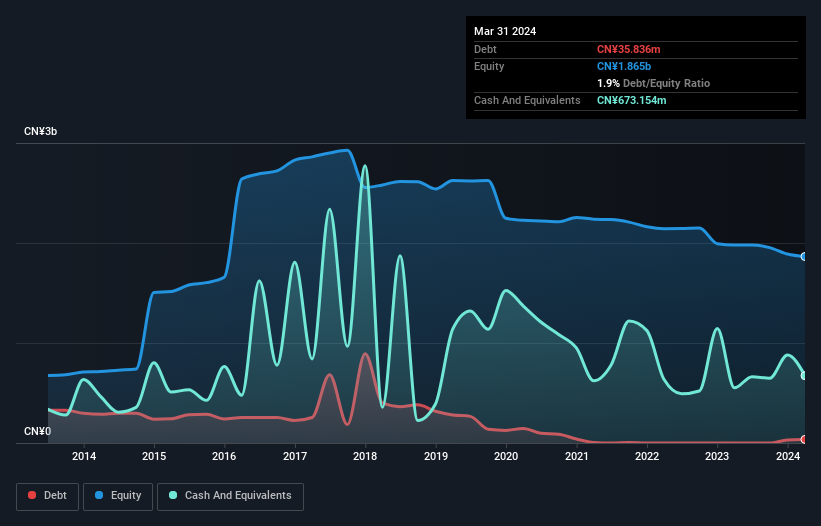Legendary fund manager Li Lu (who Charlie Munger backed) once said, 'The biggest investment risk is not the volatility of prices, but whether you will suffer a permanent loss of capital.' When we think about how risky a company is, we always like to look at its use of debt, since debt overload can lead to ruin. We note that Sinodata Co., Ltd. (SZSE:002657) does have debt on its balance sheet. But is this debt a concern to shareholders?
What Risk Does Debt Bring?
Debt assists a business until the business has trouble paying it off, either with new capital or with free cash flow. In the worst case scenario, a company can go bankrupt if it cannot pay its creditors. While that is not too common, we often do see indebted companies permanently diluting shareholders because lenders force them to raise capital at a distressed price. By replacing dilution, though, debt can be an extremely good tool for businesses that need capital to invest in growth at high rates of return. When we examine debt levels, we first consider both cash and debt levels, together.
View our latest analysis for Sinodata
What Is Sinodata's Debt?
As you can see below, at the end of March 2024, Sinodata had CN¥35.8m of debt, up from none a year ago. Click the image for more detail. However, it does have CN¥673.2m in cash offsetting this, leading to net cash of CN¥637.3m.

How Healthy Is Sinodata's Balance Sheet?
The latest balance sheet data shows that Sinodata had liabilities of CN¥562.3m due within a year, and liabilities of CN¥12.5m falling due after that. Offsetting this, it had CN¥673.2m in cash and CN¥117.0m in receivables that were due within 12 months. So it actually has CN¥215.4m more liquid assets than total liabilities.
This short term liquidity is a sign that Sinodata could probably pay off its debt with ease, as its balance sheet is far from stretched. Simply put, the fact that Sinodata has more cash than debt is arguably a good indication that it can manage its debt safely. When analysing debt levels, the balance sheet is the obvious place to start. But it is Sinodata's earnings that will influence how the balance sheet holds up in the future. So when considering debt, it's definitely worth looking at the earnings trend. Click here for an interactive snapshot.
In the last year Sinodata had a loss before interest and tax, and actually shrunk its revenue by 36%, to CN¥860m. To be frank that doesn't bode well.
So How Risky Is Sinodata?
By their very nature companies that are losing money are more risky than those with a long history of profitability. And the fact is that over the last twelve months Sinodata lost money at the earnings before interest and tax (EBIT) line. And over the same period it saw negative free cash outflow of CN¥209m and booked a CN¥122m accounting loss. While this does make the company a bit risky, it's important to remember it has net cash of CN¥637.3m. That kitty means the company can keep spending for growth for at least two years, at current rates. Even though its balance sheet seems sufficiently liquid, debt always makes us a little nervous if a company doesn't produce free cash flow regularly. The balance sheet is clearly the area to focus on when you are analysing debt. However, not all investment risk resides within the balance sheet - far from it. For example - Sinodata has 1 warning sign we think you should be aware of.
When all is said and done, sometimes its easier to focus on companies that don't even need debt. Readers can access a list of growth stocks with zero net debt 100% free, right now.
New: Manage All Your Stock Portfolios in One Place
We've created the ultimate portfolio companion for stock investors, and it's free.
• Connect an unlimited number of Portfolios and see your total in one currency
• Be alerted to new Warning Signs or Risks via email or mobile
• Track the Fair Value of your stocks
Have feedback on this article? Concerned about the content? Get in touch with us directly. Alternatively, email editorial-team (at) simplywallst.com.
This article by Simply Wall St is general in nature. We provide commentary based on historical data and analyst forecasts only using an unbiased methodology and our articles are not intended to be financial advice. It does not constitute a recommendation to buy or sell any stock, and does not take account of your objectives, or your financial situation. We aim to bring you long-term focused analysis driven by fundamental data. Note that our analysis may not factor in the latest price-sensitive company announcements or qualitative material. Simply Wall St has no position in any stocks mentioned.
About SZSE:002657
Sinodata
Engages in the application software development, and provision of technical services and related computer information system integration services in China and internationally.
High growth potential with mediocre balance sheet.
Market Insights
Community Narratives



